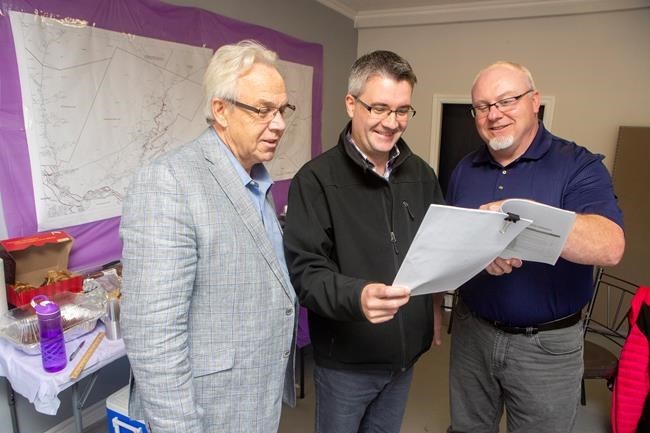
People's Alliance of New Brunswick Leader Kris Austin, centre, talks with campaign supporters Doug Mockler, left, and Reggie Barton at his satellite office in Minto, N.B., on Monday, Sept. 24, 2018. THE CANADIAN PRESS/James West
September 25, 2018 - 1:00 AM
The two parties vying to be the power brokers in New Brunswick's minority parliament could scarcely be more different when it comes to policies and leadership styles.
The vote on Monday saw surprise gains for the People's Alliance Party, a party on the right of the spectrum that has questioned policies such as ensuring francophones have the right to separate school bus services.
Its leader, Kris Austin, has a populist style, and was in an exuberant mood on Monday evening.
"This is what victory looks like folks," he told new constituents in Fredericton-Grand Lakes, with his party elected or leading in three seats of the 49-seat legislature, late on Monday night.
"The People's Alliance tapped into that frustration with the governing elites. They call themselves the People's Alliance for a reason. They're the people's party," said Don Wright, a political scientist at the University of New Brunswick in Fredericton.
The party favours dropping the moratorium on fracking, bringing in electoral recall and dropping corporate subsidies.
Meanwhile, David Coon, the Green leader who was handily re-elected in Fredericton South, adopted his familiar low-key, critical stance as his party expanded to three seats in the legislature.
His acceptance speech seemed to cast his new rival in a harsh light, perhaps signalling the message he'll be delivering about his new rival in the months to come.
"The people of Fredericton South voted for hope, not fear. They voted for kindness. ... They voted for change, not the status quo. And you voted for goodwill and not for anger," he said, as the Greens had been declared elected in three ridings — two with large francophone populations.
In an interview late Monday night, he said Austin's party is willing to strip away services to francophones in emergency medical services, and advance environmental policies that lead to carbon pollution.
"It seems willing to take people's rights away when it comes to the Acadians and francophones of this province. ... They also seem prepared to open up and support fracking to exploit shale gas in the face or risk to our water supply and climate change," he said.
"They're pretty fundamental differences."
Austin said there are some differences between the two smaller parties, but noted that both have called for an end to the spraying of glyphosate on forests and more free votes of members of the legislature.
"There's some common ground there, but we'll see how it works going forward," he said.
Both leaders have had a long, hard grind to their electoral success.
Coon took over leadership of the party in 2012, and won the party's first seat in 2014, after a career as an environmentalist who critiqued large industry's close ties with government in exploiting the province's natural resources.
Austin lost his bid for a seat by fewer than 30 votes during the 2014 election, and has spent four years gradually building the party around the province.
Neither of the two small parties won five seats, which is what's required for official party status.
However, Wright said both politicians are pondering what potential alliances they might form to advance their agendas.
"It's going to make for interesting bedfellows in a minority government," Wright said.
The political scientist said it's likely the Liberals would first approach the Green party for their support as they try to form a minority government, adding that Greens are more ideologically compatible with the Liberals than the People's Alliance.
He said the difference between the Greens and the Progressive Conservatives over a carbon tax and other environmental issues could be too large a gulf — pushing the Tories toward the People's Alliance.
Erin Crandall, a political scientist at Acadia University, said which ever party forms government will have to work with the two parties, and it will make for a different kind of governing from the norm in the province — which hasn't had a minority government in almost a century.
"It's really interesting because you have the People's Alliance and the Greens, which are kind of parties that don't necessarily kind of side easily with the two parties that are governing," she said.
"Nobody wants an election right away, and it might mean less legislation is being passed. ... But the legislation that is passed will have at least two parties support.
Follow (at)mtuttoncporg on Twitter.
News from © The Canadian Press, 2018